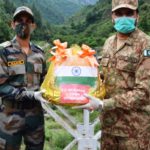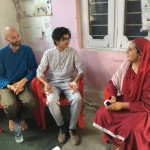LAHORE: Indian and Pakistani delegates at an Aman ki Asha conference agree on various key issues that the governments of both countries would do well to consider – not to mention taking forward the Kashmir deal earlier arrived at that now only awaits the requisite signatures’
Prominent Indian, Pakistani academics, former foreign services officers and retired armed forces personnel met in Lahore last week for a closed door dialogue on ‘A Common Destiny’, academics, the first of Aman ki Asha’s series of discussions on issues of strategic importance. During the day-long deliberations, they agreed on the need for peace between the two countries, and the importance of a sustained dialogue to resolve bilateral issues including Jammu & Kashmir, terrorism, water-sharing, trade and investment.
– WATER: India and Pakistan face the common threats of climate change and global warming that are leading to a global water scarcity. At times of water scarcity, stress levels tend to rise. The Indus Waters Treaty of 1960, termed as a ‘peace treaty’, must be followed in letter and spirit.
– VISA: One of the most effective ways of reducing conflict is to allow people to meet. India and Pakistan must do away with visa restrictions including city specific visas, police reporting, the same entry-exit points, etc.
– TERRORISM: India and Pakistan face the common threat of extremism and terrorism. Participants urged both governments to take all steps to comprehensively defeat this menace. Dialogue between the two nations should continue and not be hostage to the actions of the terrorists/spoilers.
– INTELLIGENCE SHARING: To frustrate terrorist designs, there needs to be enhanced intelligence sharing between both countries. The intelligence agencies need to talk and agree on a code of conduct.
– DEFENCE: Both countries must agree to renounce the use of force, overt or covert.
– TRADE AND INVESTMENT: South Asia forms a natural trade and economic regional block. Trade and investment develop sustainable interests and interdependencies between trading partners, creating a stake in each other’s economic development and well-being.
To speed up the emergence of a South Asian free trade area, India and Pakistan should progressively reduce tariffs and non-tariff barriers to trade. This would be particularly valuable in the realm of textiles, as current restrictions effectively prevent Pakistan’s exports from reaching the Indian domestic market.
Both countries should welcome investments in each other countries and facilitate inter- and intra-regional trade.
– INFORMATION: Enable the free flow of information between the two countries. The current bans on Indian news channels and publications in Pakistan and on Pakistani channels and publications in India must be lifted.
Lift the restriction on resident journalists in each other’s countries – according to the current exchange protocol, only two journalists from India and Pakistan are allowed to work in the other country.
– YOUTH: More than half of our population is under 25 years old. A skilled, trained and well-educated South Asia has the potential to be the global knowledge hub. Investing in this population is essential to realise the potential of our demographic dividend.
– EDUCATION: Our education budgets need to be progressively increased to a level commensurate with the focus on education that this region needs. We must also ensure that history and other textbooks are objective, accurate and non-sectarian, and free of prejudice and bias.
We strongly support the South Asian University established by governments and call upon the governments to ensure that the University is accessible to all students in the region.
– SOUTH ASIA AND SAARC: In this age of regional blocks, South Asia (SAARC) can play a dominant role on various issues confronting our planet, like: security, energy, water, environment, global trade, etc. This is in the strategic interest of both India and Pakistan.
Hope for Kashmir
At an animated televised interaction between delegates and invited members of civil society and the media on April 23 moderated by Iftikhar Ahmed of Geo TV, Mr Kasuri gave details of the Kashmir settlement that he has been hinting at for months, which made headlines in the newspapers the following day.
Mr Kasuri said he had been keeping this information for the book he is writing, but decided to break his silence at this forum. He revealed that the agreement had been arrived at after three years of sustained back-channel diplomacy and talks with all the stake-holders. It was based on a package that would de-militarise the Valley as well as Azad Jammu & Kashmir, give the Kashmiris a status ‘between independence and autonomy’, and make the disputed border irrelevant by allowing them to travel across it without visas. Significantly, neither side would present the deal as their victory and the other’s defeat.
“All that was needed was signatures from all three parties involved,” he said, explaining that the domestic situation in Pakistan had not been conducive for making the agreement public, in the wake of the movement that followed President Gen. Musharraf’s sacking of the Chief Justice.
The good news, as Mr Kasuri added is that, “There is no need to reinvent the wheel. Whenever talks resume, they will resume from the point they left off.”
We hope.
Pakistani delegates
Dr Mubashir Hasan, former federal minister, Khurshid Mehmood Kasuri, former foreign minister,IA Rehman, director HRCP, Arif Nizami, senior journalist, Shafqat Mahmood, columnist & analyst,Razzak Dawood, businessman, Khaled Ahmed, senior journalist and Amin Hashwani, businessman.
Moderator; Maj. Gen. (rtd) Mahmud Ali Durrani, former national security advisor and a prominent figure in track two dialogues between India and Pakistan.











